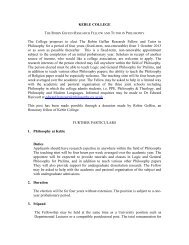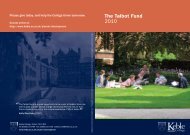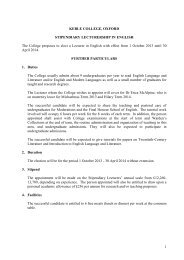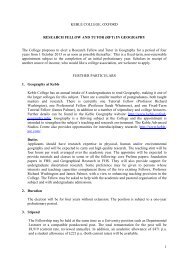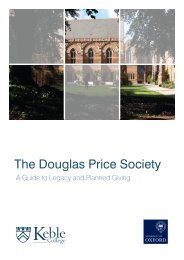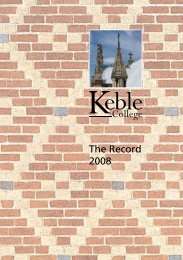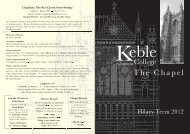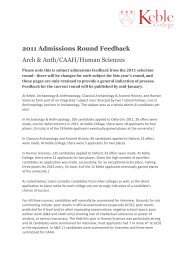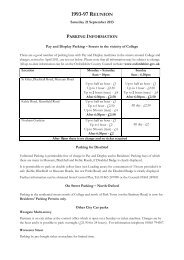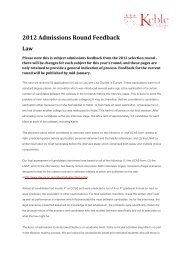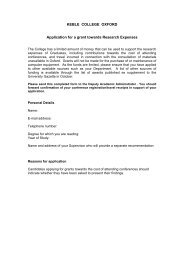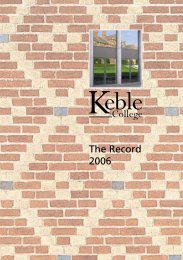The Record 2009 - Keble College - University of Oxford
The Record 2009 - Keble College - University of Oxford
The Record 2009 - Keble College - University of Oxford
You also want an ePaper? Increase the reach of your titles
YUMPU automatically turns print PDFs into web optimized ePapers that Google loves.
<strong>The</strong> <strong>College</strong> at Large<br />
To get to this recent career highlight I started <strong>of</strong>f with a longstanding<br />
interest in weather and climate and a physics degree<br />
from <strong>Oxford</strong>. Not knowing anything much about the particular<br />
topic I wanted to study, I began a Ph.D. in what I thought<br />
would be dynamical meteorology (i.e. weather) at Imperial<br />
<strong>College</strong> with an advisor who had interests in both ocean and<br />
atmosphere. Playing around with different applications <strong>of</strong> a<br />
simple vortex model I hit upon an ocean dynamics application<br />
which seemed most likely to lead to a thesis, and hence became<br />
an accidental physical oceanographer. After this accidental<br />
beginning, I made a conscious decision to stick with it, because<br />
physical oceanography is such a young field (compared to<br />
meteorology, its atmospheric counterpart) that there are still<br />
plenty <strong>of</strong> relatively fundamental problems to solve. As someone<br />
who touched a computer only once during my entire time at<br />
<strong>Oxford</strong>, it is perhaps surprising that I’ve ended up specializing<br />
in computer simulations, but fortunately I’ve had plenty <strong>of</strong><br />
patient teachers over the years. I carry out virtual laboratory<br />
experiments, using the computer code as my lab. Understanding<br />
the simulations is aided by plenty <strong>of</strong> theoretical analysis (i.e.<br />
old fashioned equation solving) and observations made by<br />
colleagues provide a continual stimulus for new problems to<br />
examine. I did go to sea once, on an 18-day research cruise from<br />
Barbados to French Guyana (sounds idyllic doesn’t it?) but I<br />
discovered it’s definitely not where my strengths are (hard to<br />
think intelligently when you feel sick).<br />
From Imperial <strong>College</strong> I moved first to MIT, and became<br />
an accidental immigrant to the US, bringing only 1 suitcase<br />
thinking I was only staying a year. 18 years later, I’ve lived in<br />
Colorado (a strange place to be an oceanographer, but they<br />
have a big climate lab there), Los Angeles, Cape Cod, and<br />
since 2004, in Princeton. I am a research oceanographer at<br />
the <strong>University</strong>, on the faculty <strong>of</strong> the graduate programme in<br />
Atmosphere and Ocean Sciences and also work closely with the<br />
Geophysical Fluid Dynamics Laboratory, a government climate<br />
modelling lab. In the middle <strong>of</strong> all this, I married (another<br />
oceanographer) and we’ve had to deal with the usual ‘two-body<br />
problem’ <strong>of</strong> finding two jobs in reasonable proximity. For many<br />
years we worked 90 miles apart, living in the middle, but with<br />
the arrival <strong>of</strong> our two children that became unsustainable. So<br />
when we were approached about two jobs at the same lab in<br />
Princeton, we upped and moved once more. It also helped that<br />
the new jobs were as good as or better than the ones we were<br />
leaving behind, for both <strong>of</strong> us. Living only 10 minutes from<br />
work makes a huge difference, not just to our personal lives<br />
but also to our careers — it’s now much easier for one <strong>of</strong> us to<br />
57



